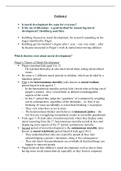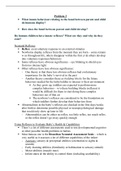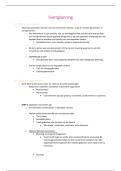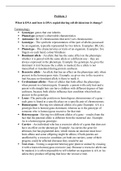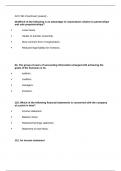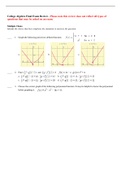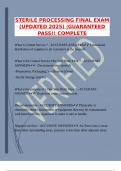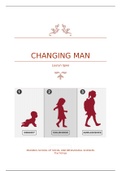Problem 6
Is moral development the same for everyone?
Is the use of dilemmas - a good method for measuring moral
development? (Kohlberg used this)
Kohlberg focused on moral development, his research expanding on the
stages identified by Piaget
Kohlberg got his bachelor’s degree after 1 year – was very smart – after
he became interested in Piaget’s work & started interviewing children
Which theories exist about moral development?
Piaget’s Theory of Moral Development
Piaget examined kids aged 4 to 12
- He watched them play & also interviewed them, asking about ethical
issues
He came w 2 different moral periods in children, which are divided by a
transition period:
First is the heteronomous morality (also known as moral realism)
period found in kids aged 4-7
- In the heteronomous morality period, kids viewed rules as being out of
people’s control – they viewed them as definitive/unchangeable
aspects of the world
- In this 1st period they judge the “goodness” of a situation by weighing
out its consequences, regardless of the intentions – ex: they’d say
breaking 10 vases accidentally is worse than breaking 1 on purpose
- They view rules/laws as set in stone
- The heteronomous thinker also believes in immanent justice – the
fact that any wrongdoing immediately results in inevitable punishment
From ages 7-10, kids enter a transition period, where they display some
moral reasoning from the 1st, heteronomous morality period & also start
displaying some aspects of the 2nd period, autonomous morality
Second period of moral development is the autonomous morality (also
known as moral relativism) period found in kids aged 10-12
- They understand that rules are created by people & they start
acknowledging a person’s intentions, along w the consequences
- They also know that punishments are avoidable & that bad things can
happen to innocent people
Piaget believed that children’s moral development evolves due to them
having more social interactions & especially as they learn to cooperate
, Piaget believed that kids’ interactions w other children lead to the most
growth in moral development
- This is because they view other kids as equals & are able to negotiate
and coordinate equally & freely, as well as rule out disagreements
- In their relationships w their parents, kids aren’t equal to their parents
& so they view them as an authority figure – leading to little moral
development
Kohlberg’s Method
Kohlberg’s main sample was made up of boys from low & middle-income
households in Chicago – they were ages 10, 13 & 16
- Later he added a little more diversity in his samples
The interview he used consisted of a series of moral dilemmas – such as
the story about Heinz
- The most important aspect wasn’t the child’s answer, (yes or no) it was
the child’s reasoning (why/why not)
- That’s why Kohlberg would use follow up questions – to get a better
understanding about their reasoning for their answer
- He would go on to give a couple more moral dilemmas in order to help
him get a good sample
- After he got the results, he split them into stages
- He checked for the reliability of his results using interrater reliability
– asking different observers to rate the results & check how many
agreed
How does moral reasoning develop in children?
Kohlberg’s 6 Stages of Moral Development
Level I: Preconventional Morality
Stage 1: Obedience & Punishment Orientation – Can’t Steal bc Stealing is Bad
First stage is similar to Piaget’s stage of moral development
Here, the child views rules as being handed down by authorities & rules
as being something you have to always obey – usually answers “he
shouldn’t steal because it’s bad/against the law”
In the first stage the child’s reasoning usually is based on the punishments
ahead – so they would say “because you’ll be punished/go to jail”
However, a child may answer “yes he should steal, because he asked the
doctor for permission first or bc what he stole wouldn’t be considered
important enough in the eyes of the law”
- Here the kid still uses stage 1 reasoning – because they reason in terms
of what authorities would allow/punish
Is moral development the same for everyone?
Is the use of dilemmas - a good method for measuring moral
development? (Kohlberg used this)
Kohlberg focused on moral development, his research expanding on the
stages identified by Piaget
Kohlberg got his bachelor’s degree after 1 year – was very smart – after
he became interested in Piaget’s work & started interviewing children
Which theories exist about moral development?
Piaget’s Theory of Moral Development
Piaget examined kids aged 4 to 12
- He watched them play & also interviewed them, asking about ethical
issues
He came w 2 different moral periods in children, which are divided by a
transition period:
First is the heteronomous morality (also known as moral realism)
period found in kids aged 4-7
- In the heteronomous morality period, kids viewed rules as being out of
people’s control – they viewed them as definitive/unchangeable
aspects of the world
- In this 1st period they judge the “goodness” of a situation by weighing
out its consequences, regardless of the intentions – ex: they’d say
breaking 10 vases accidentally is worse than breaking 1 on purpose
- They view rules/laws as set in stone
- The heteronomous thinker also believes in immanent justice – the
fact that any wrongdoing immediately results in inevitable punishment
From ages 7-10, kids enter a transition period, where they display some
moral reasoning from the 1st, heteronomous morality period & also start
displaying some aspects of the 2nd period, autonomous morality
Second period of moral development is the autonomous morality (also
known as moral relativism) period found in kids aged 10-12
- They understand that rules are created by people & they start
acknowledging a person’s intentions, along w the consequences
- They also know that punishments are avoidable & that bad things can
happen to innocent people
Piaget believed that children’s moral development evolves due to them
having more social interactions & especially as they learn to cooperate
, Piaget believed that kids’ interactions w other children lead to the most
growth in moral development
- This is because they view other kids as equals & are able to negotiate
and coordinate equally & freely, as well as rule out disagreements
- In their relationships w their parents, kids aren’t equal to their parents
& so they view them as an authority figure – leading to little moral
development
Kohlberg’s Method
Kohlberg’s main sample was made up of boys from low & middle-income
households in Chicago – they were ages 10, 13 & 16
- Later he added a little more diversity in his samples
The interview he used consisted of a series of moral dilemmas – such as
the story about Heinz
- The most important aspect wasn’t the child’s answer, (yes or no) it was
the child’s reasoning (why/why not)
- That’s why Kohlberg would use follow up questions – to get a better
understanding about their reasoning for their answer
- He would go on to give a couple more moral dilemmas in order to help
him get a good sample
- After he got the results, he split them into stages
- He checked for the reliability of his results using interrater reliability
– asking different observers to rate the results & check how many
agreed
How does moral reasoning develop in children?
Kohlberg’s 6 Stages of Moral Development
Level I: Preconventional Morality
Stage 1: Obedience & Punishment Orientation – Can’t Steal bc Stealing is Bad
First stage is similar to Piaget’s stage of moral development
Here, the child views rules as being handed down by authorities & rules
as being something you have to always obey – usually answers “he
shouldn’t steal because it’s bad/against the law”
In the first stage the child’s reasoning usually is based on the punishments
ahead – so they would say “because you’ll be punished/go to jail”
However, a child may answer “yes he should steal, because he asked the
doctor for permission first or bc what he stole wouldn’t be considered
important enough in the eyes of the law”
- Here the kid still uses stage 1 reasoning – because they reason in terms
of what authorities would allow/punish

